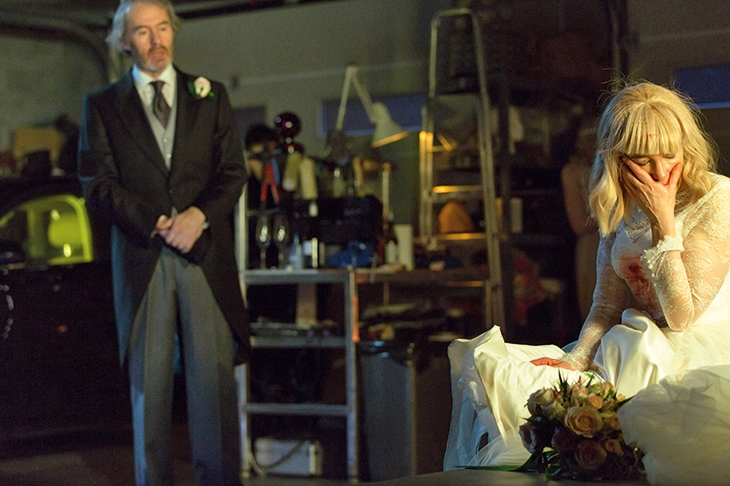The NT’s new play is an update of Pamela, a sexploitation novel by Samuel Richardson. It opens with Stephen Dillane and Cate Blanchett stranded in a concrete garage dressed as French maids. On one side, a black Audi saloon. Mid-stage, colourful blinking lights. At the edges, four other actors lurking. The main characters have no names so let’s call them Stephen and Cate. Who are they? Adulterous workmates, or a divorcing couple, or a male boss and his abused underling? The script reveals nothing about their characters, their backgrounds, their location or their intentions, and the audience’s natural reaction to this indifference is further indifference.
Stephen and Cate grapple physically and deliver a lot of speeches about abuse and humiliation, but their dialogue isn’t supported by any hint of carnal attraction. It’s like watching a hornet mating with a Polo Mint. They swap costumes and identities. He dons her blonde wig and becomes a she. She wears his grey suit and becomes a he. Nothing becomes clearer. They tumble about on the back seat of the Audi simulating sex while two female voyeurs in school uniform watch. Are these Stephen’s daughters? Not sure.
Between each scene, the players move to new positions in slow motion as if to remind us that the first job of art is to inflict boredom on the beholder. And the show doesn’t restrict its cruelty to the audience. A beautiful plump actress has to endure the charmless query ‘why are you so fat?’ from Stephen. He then gets lured into a fight with a strapping bodybuilder twice his weight and half his age. Yet Stephen wins. Towards the end, Cate dons a vast white bridal gown like a puff of mist. The defeated bodybuilder is summoned to pay his respects and he savagely masturbates Cate while she recites another speech and fakes an orgasm.
What’s going on here? Martin Crimp is too smart a playwright to have created this car crash by accident. And he gives the show a cryptically teasing title. ‘When We Have Sufficiently Tortured Each Other’ sounds like the executive summary of an annual report from the Arts Council. My guess is that this is an ironic scam designed to expose the NT’s gullibility and lack of judgment. If the directorial team can’t distinguish genuine drama from pseudo-dadaist poppycock, they should make way for people who can. Crimp’s mischief has also trapped several unwary critics, who claim to have found aesthetic merit in his prank. As art, it’s valueless. As drama, it’s unapproachable. As soft porn it’s too timid to raise the sap. As a hoax, it’s a winner.
Leave to Remain is about a London yuppie, Obi, whose American boyfriend, Alex, needs a passport. They decide to marry. The show opens as a pumped-up dance session that tells us how the love bunnies met and fell for each other. This is tedious. An audience can’t engage with a romance until it appears to be doomed. After a few athletic prance routines, the show turns into a full-blown musical, which is all right, if unexpected. Finally it settles down as a drama and the script starts to sparkle with wacky comedy. ‘The childminder’s got the norovirus,’ says Obi’s sister. ‘I need to tweet my flock,’ enthuses a trendy vicar.
At the heart of the drama lies a conflict between Obi and his devoutly Christian parents. His dad (Cornell S. John) blames Obi’s sexuality on Britain. ‘We should have sent you back to Nigeria.’ ‘Yeah,’ jeers Obi, ‘because there are no gays in the motherland.’ The writers, Kele Okereke and Matt Jones, have wisely given Obi’s old-fashioned parents as much dignity and humanity as Obi himself. Matters are complicated by Alex’s cheery all-American folks who fly in for the wedding and can’t wait to meet Obi. ‘They aren’t going to like me,’ he frets. ‘It’s worse,’ says Alex. ‘They’ll prefer you.’ When Obi’s parents show up to meet Alex’s family, the encounter becomes painfully hilarious. Camp Alex greets Obi’s Dad with a charming ‘How are you?’ A frosty hand is extended. ‘Couldn’t be better.’ At the end of their fraught encounter, Dad announces: ‘I would like it put on record that I behaved impeccably.’ An innocuous line but it won a laugh that shook the timbers of the theatre.
The show’s ending becomes a little earnest and predictable and the twist involving the shrink is weak. And I wasn’t convinced that the songbook and the dance numbers had been properly integrated with the story. If anything, I wanted less music and more about Obi’s troubled teenage years and his mother’s early struggles. And I was ready to hear plenty more from his sharp-tongued sister Chichi.
This is an imperfect show, but its centre-piece, the appallingly difficult dinner party, deserves to be committed to film.







Comments